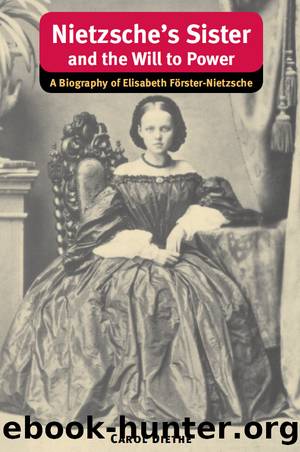Nietzsche's Sister and the Will to Power by Carol Diethe

Author:Carol Diethe
Language: eng
Format: epub
Tags: BIOGRAPHY & AUTOBIOGRAPHY / Women
Publisher: University of Illinois Press
Published: 2022-08-26T00:00:00+00:00
up as âwoman as such,â âhigher woman,â âwoman as idealist,â they want to bring the general rank structure of women down; no surer method for this than grammar-school education, trousers, and political rights for gullible voters. Emancipated women are fundamentally the anarchists of the realm of the âEternal-Womanly,â those who have come off badly and whose underlying instinct is revenge.5
Nietzscheâs âemancipatedâ women friends included Malwida von Meysen-bug, whose Memoiren einer Idealistin, a seminal work for German feminism, had appeared in 1876, the very year that Nietzsche spent the whole winter with her in Sorrento. Malwidaâs book describes her exile to London after the 1848 revolutions; here she gave German lessons and was for several years housekeeper to the widowed Russian political émigré Alexander Herzen, before turning to writing for an income. Nietzscheâs curses upon women who remained single and, worse still, wrote, appeared in print after the friendship with Malwida had cooled slightly, since Malwida was and remained an ardent Wagnerian. We can only wonder whether Nietzsche and Malwida ever actually discussed his views on female emancipation.
Meta von Salis first came into contact with Nietzsche through Malwida, whose book had fired Meta with enthusiasm for the feminist cause. Subsequently, as we have seen, Meta was so devoted to Nietzsche that she made sure he was decently housed in Weimar. Meta von Salis refused to be drawn into an argument over Nietzscheâs misogynist remarks. In her tract Philosoph und Edelmensch: Ein Beitrag zur Charakteristik Friedrich Nietzsches (Philosopher and Gentleman: A Contribution to the Description of Friedrich Nietzsche), she actually attacked the many vain and superficial women who gave Nietzsche legitimate cause to berate them. Elisabeth, too, found this the best strategy to adopt, as we shall see below. Several students from the University of Zurich, among them Hedwig Kym, Resa von Schirnhofer, and Helene Druskowitz, were also well disposed toward Nietzsche, though they might have paused had they known how Nietzsche spoke about them in his letters (as in his letter to Elisabeth, quoted early in this chapter). Helene Druskowitz took exception to his moral philosophy (as well as his misogyny) and criticized him openly.
Nietzscheâs codex for women placed Elisabeth in a very difficult position. She had a talent for writing and no talent at all for finding a husband and having babies. Nietzsche had stressed that the emancipated woman seeks her revenge on other women, a statement that is absurd if one reflects that the patriarchal system in Germany gave men rights over women, enshrined in law, which extended to womenâs bodies: a husband could insist upon his conjugal rights and could determine when, or indeed if, his wife should breast-feed her baby. Even the civil code of 1900 did little to improve womenâs status in Wilhelmine German society. Nietzsche displaces the very real grievance women had over their inequality onto the women concerned: by stating that those women who have managed to fulfil their biological destiny are the envy of their emancipated sisters, he makes the emancipated woman the repository of ressentiment.
Download
This site does not store any files on its server. We only index and link to content provided by other sites. Please contact the content providers to delete copyright contents if any and email us, we'll remove relevant links or contents immediately.
The remains of the day by Kazuo Ishiguro(7604)
Tools of Titans by Timothy Ferriss(7004)
The Black Swan by Nassim Nicholas Taleb(6240)
Giovanni's Room by James Baldwin(5940)
Inner Engineering: A Yogi's Guide to Joy by Sadhguru(5931)
The Way of Zen by Alan W. Watts(5831)
The Six Wives Of Henry VIII (WOMEN IN HISTORY) by Fraser Antonia(4816)
The Power of Now: A Guide to Spiritual Enlightenment by Eckhart Tolle(4796)
Astrophysics for People in a Hurry by Neil DeGrasse Tyson(4641)
Asking the Right Questions: A Guide to Critical Thinking by M. Neil Browne & Stuart M. Keeley(4628)
12 Rules for Life by Jordan B. Peterson(3783)
The Ethical Slut by Janet W. Hardy(3535)
Skin in the Game by Nassim Nicholas Taleb(3503)
Housekeeping by Marilynne Robinson(3443)
The Art of Happiness by The Dalai Lama(3409)
Double Down (Diary of a Wimpy Kid Book 11) by Jeff Kinney(3304)
Skin in the Game: Hidden Asymmetries in Daily Life by Nassim Nicholas Taleb(3290)
Walking by Henry David Thoreau(3251)
12 Rules for Life: An Antidote to Chaos by Jordan B. Peterson(3216)
